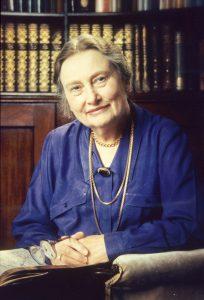
Mollie McGeown was an outstanding renal physician and clinical scientist. Originally trained in laboratory medicine and biochemistry, she later pioneered both dialysis and renal transplantation in Northern Ireland and gained world-wide recognition for her famous ‘Belfast recipe’ of post-transplant management, based on a low dose steroid policy. She made important contributions to our knowledge of renal stones and parathyroid disease, and was an expert on electrolyte disorders.
Born of farming stock, with a family tradition in medicine, she graduated with honours at Belfast. After a time in laboratory medicine, and a PhD in biochemistry, she became a clinical fellow at the Royal Victoria Hospital, Belfast, and gained an international reputation for her work on stone disease. She was the first woman (and first physician) to be elected to the British Association of Urological Surgeons.
In 1959, at the request of Sir Graham Bull [Munk’s Roll, Vol. VIII, p.65], she was appointed to set up a dialysis service at the Belfast City Hospital, at first for acute, and later for chronic end-stage renal failure. Supported by a small team, she learned ‘on the job’, since the pressure of new patients allowed no time to train elsewhere. Following the introduction of azathioprine by Roy Calne in 1962, Mollie provided patients for early cadaveric transplants, but soon transferred the technique to Belfast, opening a combined renal and transplant unit in 1968. The ‘Belfast recipe’ evolved as a response to the crippling mortality from infection brought about by heavy immunosuppression. It combined cautious anti-rejection, based on low dose steroids, with intensive care and a commitment to patient support, including return to dialysis if the graft failed. Today this appears obvious, but at that time, when dialysis spaces were very few, such integrated management was often impossible. The ‘recipe’ produced 80 per cent cumulative five year graft survival, showing that transplantation could be both effective and safe. With the advent of cyclosporin, success rates steadily improved.
Following a review in 1984, the availability of dialysis, which had stagnated in the UK due to lack of Government funding, improved steadily, with attention to the plight of diabetics and older patients. Mollie’s research into the incidence and prevalence of renal failure in the community had been a key incentive. By the time she retired in 1988, the modern explosion of facilities was under way. In addition to over 350 articles, she had contributed to numerous books, as well as producing an excellent work on the management of electrolyte disorders. Following retirement she edited and contributed to a manual on clinical transplantation, outlining the Belfast regime, and continued in active research until 2004.
Mollie achieved many distinctions, including chairmanship of the UK Transplant Management Committee, presidency of the Renal Association and membership of the council of the British Transplantation Society. She served on the renal services review for greater London and on the Unrelated Living Transplant Regulatory Authority. She gained the CBE for services to medicine and in 1988 a professorial fellowship at Belfast. In 1998, on the 50th anniversary of the NHS, she was chosen as one of 50 women who had contributed most to its success.
Mollie’s chief qualities were wide background knowledge, shrewd clinical acumen, dedication, administrative ability, reliability, resolution and legendary force of character. Minute physically, she exuded massive clinical and moral authority. She aimed at excellence and expected the same of her colleagues. Able to overawe and compel by personality, she nevertheless inspired respect, affection and love in many. Her professional combativeness, which made some fear and others dislike her, was offset by an innate goodness and respect for reason which never failed her. Above all, Mollie cared for the lives and well-being of her patients, for which they returned respect and admiration, some seeming to believe her even capable of ‘raising the dead’! One practical result was the Northern Ireland Kidney Research Fund, founded by a renal patient in 1971, which has become a vital support for renal research in the province. Mollie was its adviser, and later patron, for many years.
To those who knew her well, Mollie was far from being the forbidding figure of clinical retribution which so many house officers and nurses dreaded. On discarding this formidable (and extremely useful) character with her white coat, she revealed a delightful and witty personality, with some endearingly ‘feminine’ qualities, such as a dramatically ‘approximate’ approach to car parking! She had a well-informed love of antique furniture and was an enthusiastic researcher of her family history. She combined an exhausting medical career with a full-time role as housewife and mother. Married for many years to Max Freeland, senior administrator at Queen’s University, until his death in 1982, she raised a family of three talented boys, as well as becoming the beloved stepmother of Max’s children from a former marriage. With her husband, and later on her own, she presided over a comfortable, efficient, liberal and enlightened household, to which she made her colleagues welcome as a diligent and charming hostess. Her concern and kindness were often on view in the renal unit during social occasions, such as Christmas, when all staff received a special gift, and visiting speakers’ banquets, at which the same personal kindness and generosity was extended to every guest. Mollie was truly an exceptional human being.
[References:The Times 3 Jan 2005; Brit.med.J.,2005,330,365]
Courtesy Royal College of Physicians London, Munk’s Roll, Volume XII, page web